Related Research Articles

Cambridge University Library is the main research library of the University of Cambridge. It is the largest of over 100 libraries within the university. The library is a major scholarly resource for members of the University of Cambridge and external researchers. It is often referred to within the university as the UL. Thirty-three faculty and departmental libraries are associated with the University Library for the purpose of central governance and administration, forming "Cambridge University Libraries".

The National Library of Wales, in Aberystwyth, is the national legal deposit library of Wales and is one of the Welsh Government sponsored bodies. It is the biggest library in Wales, holding over 6.5 million books and periodicals, and the largest collections of archives, portraits, maps and photographic images in Wales. The Library is also home to the national collection of Welsh manuscripts, the National Screen and Sound Archive of Wales, and the most comprehensive collection of paintings and topographical prints in Wales. As the primary research library and archive in Wales and one of the largest research libraries in the United Kingdom, the National Library is a member of Research Libraries UK (RLUK) and the Consortium of European Research Libraries (CERL).
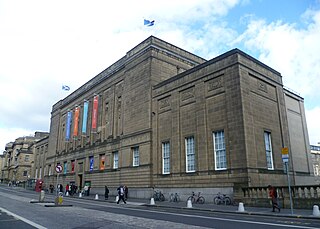
The National Library of Scotland is one of the country's National Collections. It is one of the largest libraries in the United Kingdom. As well as a public programme of exhibitions, events, workshops, and tours, the National Library of Scotland has reading rooms where visitors can access the collections. It is the legal deposit library of Scotland and is a member of Research Libraries UK (RLUK) and the Consortium of European Research Libraries (CERL).

The National Library of Australia (NLA), formerly the Commonwealth National Library and Commonwealth Parliament Library, is the largest reference library in Australia, responsible under the terms of the National Library Act 1960 for "maintaining and developing a national collection of library material, including a comprehensive collection of library material relating to Australia and the Australian people", thus functioning as a national library. It is located in Parkes, Canberra, ACT.
Landsbókasafn Íslands – Háskólabókasafn is the national library of Iceland which also functions as the university library of the University of Iceland. The library was established on December 1, 1994, in Reykjavík, Iceland, with the merger of the former national library, Landsbókasafn Íslands, and the university library. It is the largest library in Iceland with about one million items in various collections. The library's largest collection is the national collection containing almost all written works published in Iceland and items related to Iceland published elsewhere. The library is the main legal deposit library in Iceland. The library also has a large manuscript collection with mostly early modern and modern manuscripts, and a collection of published Icelandic music and other audio. The library houses the largest academic collection in Iceland, most of which can be borrowed for off-site use by holders of library cards. University students get library cards for free, but anyone can acquire a card for a small fee. The library is open for public access.
Ronald Milne FRSE is a British librarian and administrator whose work has been particularly associated with the development of library research collections and with issues of digitisation of library materials. In 2006 he became a Fellow of The Royal Society of Edinburgh.

The British Library is a research library in London that is the national library of the United Kingdom. It is one of the largest libraries in the world. It is estimated to contain between 170 and 200 million items from many countries. As a legal deposit library, the British Library receives copies of all books produced in the United Kingdom and Ireland, including a significant proportion of overseas titles distributed in the UK. The Library is a non-departmental public body sponsored by the Department for Culture, Media and Sport.
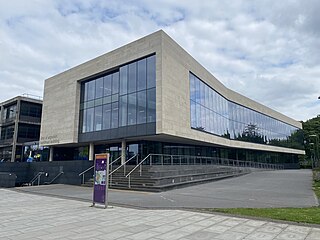
The James Hardiman Library serves the University of Galway in Ireland. It is a legal deposit or "copyright library", which means that publishers in the country must deposit a copy of all their publications there, free of charge. The James Hardiman Library is home to an extensive range of cultural artefacts, particularly relating to the history of theatre. This includes the largest digital theatre archive in the world, a joint project with The Abbey, Ireland's national theatre, to preserve material that institution has compiled since its foundation. Other theatre archives found at the James Hardiman Library include those of the Gate Theatre, An Taibhdhearc, the Lyric Theatre and the Druid Theatre Company. In addition, manuscripts collected by Douglas Hyde, the first President of Ireland, are deposited at the James Hardiman Library, as is a manuscript personally donated by James Joyce in 1932.

Trove is an Australian online library database owned by the National Library of Australia in which it holds partnerships with source providers National and State Libraries Australia, an aggregator and service which includes full text documents, digital images, bibliographic and holdings data of items which are not available digitally, and a free faceted-search engine as a discovery tool.
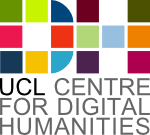
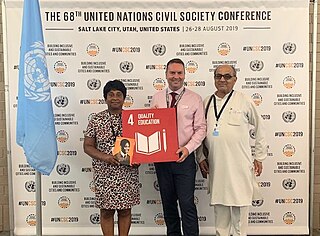
Dominic Shellard is a British academic who has served as Head of the School of English and Pro-Vice-Chancellor at the University of Sheffield and Vice-Chancellor of De Montfort University. A former Rotherham Councillor, he is a recipient of the Mahatma Gandhi Seva Medal, awarded by the United Nations NGO, the Gandhi Global Family, for his 'social good work' in the UK and India.
The JISC Digitisation Programme was a series of projects to digitise the cultural heritage and scholarly materials in universities, libraries, museums, archives, and other cultural memory organizations in the United Kingdom, from 2004 to 2010 The program was managed by the UK's Joint Information Systems Committee, the body that supports United Kingdom post-16 and higher education and research in support of learning, teaching, research and administration in the context of ICT.
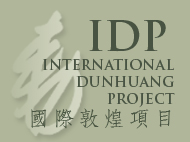
The International Dunhuang Project (IDP) is an international collaborative effort to conserve, catalogue and digitise manuscripts, printed texts, paintings, textiles and artefacts from the Mogao caves at the Western Chinese city of Dunhuang and various other archaeological sites at the eastern end of the Silk Road. The project was established by the British Library in 1994, and now includes twenty-two institutions in twelve countries. As of 18 February 2021 the online IDP database comprised 143,290 catalogue entries and 538,821 images. Most of the manuscripts in the IDP database are texts written in Chinese, but more than fifteen different scripts and languages are represented, including Brahmi, Kharosthi, Khotanese, Sanskrit, Tangut, Tibetan, Tocharian and Old Uyghur.

Transcribe Bentham is a crowdsourced manuscript transcription project, run by University College London's Bentham Project, in partnership with UCL Centre for Digital Humanities, UCL Library Services, UCL Learning and Media Services, the University of London Computer Centre, and the online community. Transcribe Bentham was launched under a twelve-month Arts and Humanities Research Council grant.
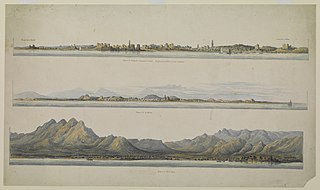
Qatar Digital Library (QDL) is a bilingual online library which was launched as a joint venture by a partnership consisting of Qatar Foundation, Qatar National Library and the British Library in October 2014. QDL comprises one of the largest online collections of historic records on the Persian Gulf countries.
The Pacific Manuscripts Bureau is a non-profit organisation sponsored by an international consortium of libraries specialising in Pacific research. The Pacific Manuscripts Bureau was formed in 1968 to copy archives, manuscripts and rare printed material relating to the Pacific Islands. The aim of the Bureau is to help with long-term preservation of the documentary heritage of the Pacific Islands and to make it accessible.
Elisabeth Bennett is former University Archivist of Swansea University. Appointed in 1993, Elisabeth has developed the archives from a one-person, limited service, to the first university archive in the UK, and the first in Wales, to attain Archives Service Accreditation.

The Endangered Archives Programme (EAP) is a funding programme and digital archive run by the British Library in London. It has the purpose of preserving cultural heritage where resources may be limited. Each year EAP awards grants to researchers to identify and preserve culturally important archives by digitising them in situ. The original archival material does not leave the country of origin, and projects often incorporate local training and career development. EAP focuses on material created before the mid twentieth century.
Unlocking Film Heritage (UFH) was one of the biggest film digitisation projects ever undertaken and it encompassed the BFI National Archive together with national and regional audiovisual archival institutions in United Kingdom. Between 2013–2017 around 10,000 titles, capturing 120 years of Great Britain on film, were digitised and made free-to-access in a variety of ways. Many archival clips can be watched for free online via BFI Player.
'Unlocking Our Sound Heritage' (UOSH) is a UK-wide project that aims to preserve, digitise and provide public access to a large part of the nation's sound heritage. The UOSH project forms part of the core programme 'Save Our Sounds' led by the British Library and involving a consortium of ten regional and national archival institutions. Between 2017 and 2022 the aim is to digitise and make available up to 500,000 rare and unique sounds recordings, not only from the British Library's collection but from across the UK, dating from the birth of recorded sound in the 1880s to the present time. The recordings include sounds such as local dialects and accents, oral histories, previously inaccessible musical performances and plays, and rare wildlife sounds. The consortium will also deliver various public engagement programmes, and a website where up to 100,000 recordings will be freely available to everyone for research, enjoyment and inspiration.